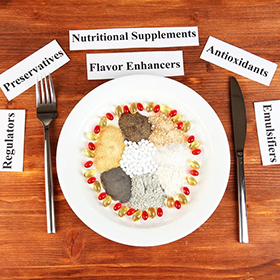
Until very recently little research has been done on the impact of food additives on the gut microbiome, despite their widespread use. Food additives are substances intentionally added during production, processing, packaging, transportation, or storage of commercial food products. However, many food additives including emulsifiers, flavor enhancers, non-caloric artificial sweeteners, organic solvents, gluten and nanoparticles are increasingly used in food processing and being shown to negatively impact microbiota composition.[1]
Emulsifiers, a ubiquitous component of processed foods, and often considered inert have been shown to adversely affect the composition of the gut microbiota and lead to low-grade inflammation.[2] In the intestines a multilayered mucus structure covers the intestinal surface allowing the vast majority of gut bacteria to be kept at a safe distance from gut cells that line the intestine.[3] It seems that emulsifiers, which have detergent-like molecules dissolve and damage the mucous membrane leading to bacterial and toxin movement across gut wall.[4]
In experiments the commonly used food additives, carrageenan (407) and carboxymethylcellulose (466) (CMC) are used to develop intestinal inflammation in animal models. Animal and human studies consistently report that carrageenan and CMC induce cell changes that are typical of inflammatory bowel disease while altering the microbiome, disrupting the intestinal lining and stimulating inflammation.[5] Carrageenan is commonly used and has substantially increased over the last 50 years[6] as a thickening and emulsifying food additive to improve the texture of commercial food products. It is found in milk alternatives such as almond and soy milk, processed meats, and soy-based products, dairy products such as chocolate milk, ice cream, cottage cheese, sour cream, and yogurt, mayonnaise and infant formula.[7]
Two recently studied synthetic dietary emulsifiers polysorbate 80 (P80) and carboxymethylcellulose (CMC) promote inflammatory gut disorders and act directly our microbiome to increase inflammation. As a result the studies suggest that broad use of emulsifying agents might be contributing to increased incidence of obesity, metabolic syndrome and other chronic inflammatory diseases. To support this transferring feces from emulsifier-treated mice to healthy mice resulted in similar host and microbial alterations observed in mice directly treated with emulsifiers[8] including tumor development and low-grade gut inflammation.[9] Carboxymethylcellulose use is widespread throughout the food industry in products typically consumed by children including candy, chewing gum, “snack foods,” ketchup, and various baked goods, and currently, there are no quantitative restrictions on its use nor does its addition to food require to be declared in most countries.[10]
[1] Lerner and Matthias, 2015.
[2] Chassaing et al., 2015.
[3] Johansson et al., 2008.
[4] Roberts et al., 2010.
[5] Martino et al., 2017.
[6] Tobacman et al., 200; Borthakur et al., 2007.
[7] Borthakur et al., 2007.
[8] Chassaing et al., 2017.
[9] Viennois et al., 2017.
[10] Swidsinski et al., 2009.